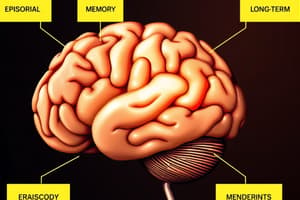Podcast
Questions and Answers
What is long-term memory (LTM)?
What is long-term memory (LTM)?
- Memory stage that requires conscious effort to remember.
- Memory stage in which information is stored for a long period of time. (correct)
- Memory stage for a temporary period.
- Memory stage with limited capacity.
What type of memory is explicit (declarative) memory?
What type of memory is explicit (declarative) memory?
Long-term memory for factual knowledge and personal experiences
What does semantic memory refer to?
What does semantic memory refer to?
Explicit memory for factual knowledge
What is episodic memory?
What is episodic memory?
What does implicit (non-declarative) memory involve?
What does implicit (non-declarative) memory involve?
What are procedural memories?
What are procedural memories?
Define emotional memories.
Define emotional memories.
What is priming in the context of memory?
What is priming in the context of memory?
What does the term amnesic refer to?
What does the term amnesic refer to?
What is anterograde amnesia?
What is anterograde amnesia?
Define retrograde amnesia.
Define retrograde amnesia.
What effect does damage to the hippocampus have?
What effect does damage to the hippocampus have?
What happens when there is damage to the cerebellum?
What happens when there is damage to the cerebellum?
What is infantile/child amnesia?
What is infantile/child amnesia?
What is a free recall task?
What is a free recall task?
What does recognition in memory refer to?
What does recognition in memory refer to?
What is recall in the context of memory?
What is recall in the context of memory?
What is the primacy effect?
What is the primacy effect?
Define the recency effect.
Define the recency effect.
What is the serial position effect?
What is the serial position effect?
Flashcards are hidden until you start studying
Study Notes
Long-Term Memory Concepts
- Long-term memory (LTM) involves the storage of information for extended periods, potentially permanently, with an essentially infinite capacity.
- Explicit memory (declarative) refers to remembering facts and personal experiences, requiring conscious effort and declaration.
Types of Explicit Memory
- Semantic memory is the storage of factual knowledge, composed of personally deemed truths (e.g., Washington being the first president).
- Episodic memory refers to autobiographical recollections of personal experiences (e.g., memories of a first kiss).
Implicit Memory
- Implicit memory (non-declarative) encompasses procedural tasks and learned responses that do not require conscious awareness, like driving a car.
- Procedural memories involve cognitive and motor tasks with a physical component (e.g., ringing a bell for a tennis ball).
Memory and Emotion
- Emotional memories refer to emotions linked to specific recollections, influencing recall based on feelings associated with the memory.
Memory Processes
- Priming describes how past stimuli influence responses to new stimuli without conscious recollection of the earlier information.
- A person with amnesia experiences severe memory deficits often linked to brain injury or surgery.
Forms of Amnesia
- Anterograde amnesia prevents the formation of new explicit long-term memories after brain damage, preserving pre-existing memories.
- Retrograde amnesia disrupts memory retrieval for events prior to trauma, significantly affecting episodic memories.
Brain Structures and Memory
- Damage to the hippocampus results in difficulties with explicit memory formation.
- Cerebellar damage impacts implicit memory, affecting skills such as tying shoes or riding a bike.
Childhood and Memory Recall
- Infantile/child amnesia refers to the inability to recall memories before age three due to the underdevelopment of the hippocampus.
Memory Retrieval Techniques
- Free recall task requires participants to retrieve a list of items in any order after presentation.
- Recognition involves identifying presented information (e.g., multiple-choice tests).
- Recall is retrieving information without cues (e.g., short answer assessments).
Memory Effects
- Primacy effect highlights superior recall of early items in a list during free recall tasks.
- Recency effect demonstrates better recall for the last items in a list.
- Serial position effect explains the tendency to remember items based on their position within a sequence.
Studying That Suits You
Use AI to generate personalized quizzes and flashcards to suit your learning preferences.




